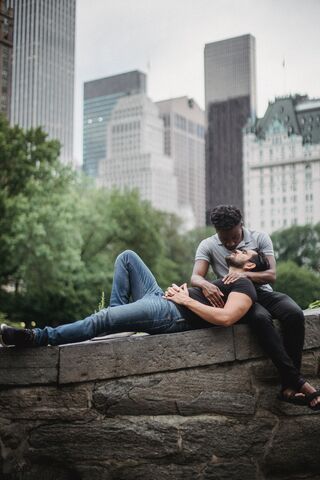Attachment
Is Femmephobia in Gay Culture Contributing to Loneliness?
When femininity is shunned, opportunities for connection may be lost.
Posted December 31, 2020
This piece was co-authored with Dr. Adam Davies of the University of Guelph.
In a world of dating that often seems to be based upon split-second decisions of swiping one way or another, the communication of dating preferences often seems to get reduced to the simplest and bluntest of terms. On many apps that cater to gay men, it is not uncommon to see headlines that explicitly state the types of people someone is not interested in dating or hooking up with—such as “no fats, no femmes!” Indeed, the devaluation of femininity, or femmephobia, seems to be a common trait of contemporary gay culture. Yet, at the same time, numerous researchers have also been exploring the concept of loneliness among gay men through the juxtaposition of "dating" apps that predominantly focus on short-term hook-ups while denying the desires of gay men to find lasting relationships. Femmephobia and loneliness may seem rather distant topics from each other but, in fact, might be feeding into a vicious circle.
At the most literal level, when someone headlines their dating profile with “no femmes,” they are indicating that they are not interested in a partner who has more feminine traits or characteristics. Often this might refer to fashion style, tone of voice, or mannerisms, but it could also apply to other behaviors, such as nurturance, emotional vulnerability, a desire for love, or even a desire for a relationship. Recent research has explored the experiences of gay men on dating apps and found that many report the need to hide or suppress their emotional needs or desires in an effort to appear more masculine and, consequently, more desirable. The pressure to adhere to masculine norms within the gay community may be interfering with perceptions of social support and meaningful social connections, thereby inadvertently contributing to a pandemic of loneliness.
Adherence to masculine norms does not only play out when seeking romantic and sexual partners but can also influence how individuals behave within their relationships. In looking at cultural depictions of attachment styles, it is not uncommon to associate anxious attachment styles with femininity or feminine qualities (e.g., neediness, insecurity), while avoidant attachment styles might be viewed as hyper-masculine (e.g., independent, untouchable). The gendered nature of insecure attachment styles could contribute to gay men with anxious attachment styles being perceived as more feminine and therefore, less desirable while increasing the apparent desirability of those with more avoidant attachment styles. Of course, relationship research has long observed that those with secure attachment styles fare best, which allows for an appropriate degree of comfort with intimacy and closeness, combined with a positive and independent sense of self.

A recent study from the University of Padova in Padua, Italy, examined the associations between attachment styles of gay men and their reported levels of internalized homophobia. However, instead of simply assessing whether internalized homophobia was higher or lower among men with different attachment styles, the researchers also explored the role of perceived social support. The sample consisted of 70 men who identified as gay and who completed questionnaires assessing attachment style, internalized homophobia, and perceived social support.
Men with insecure attachment styles (either anxious or avoidant) reported lower perceived social support, which, in turn, was associated with higher levels of internalized homophobia. The findings make sense if one considers how either type of insecure attachment style may contribute to a lack of connection within the gay male community.
In the case of those with anxious attachment styles, if they are perceived as more feminine, this may lead to greater rejection from the community and consequently a lower sense of support. At the same time, those with avoidant attachment styles might be viewed as more desirable but still lack a sense of community or social support due to avoiding the types of behaviors that might allow for deeper relationships to form. In either case, lacking a strong sense of social support appears to be associated with one's internalization of society's negative views about same-sex sexuality.
Analyzing these dynamics within gay men’s communities through the lens of femmephobia is important for understanding how gay men’s experiences of being shunned or bullied for feminine traits may push them towards more avoidant attachment styles. If men are teased as children for being emotionally sensitive and vulnerable and then experience femmephobia due to openly seeking emotional intimacy and/or romantic relationships in gay men’s communities as adults, such experiences could reinforce the predominance of avoidant attachment dynamics. Tackling the community's continued expressions of femmephobia may be a starting point for encouraging the development of "earned" secure attachment styles, consequently leading to greater feelings of social and community support and, ultimately, lower rates of loneliness.
References
Calvo, V., Cusinato, M., Meneghet, N., & Miscioscia, M. (2020). Perceived Social Support Mediates the Negative Impact of Insecure Attachment Orientations on Internalized Homophobia in Gay Men. Journal of Homosexuality, 1-19.
Davies, A.W. & Hoskin, R.A. (2019, Dec. 9th). 10-year Challenge reveals femmephobia in gay communities. The Conversation. Retrieved from https://theconversation.com/10-year-challenge-reveals-femmephobia-in-gay-communities-127783.
Hoskin, R. A. (2019). Femmephobia: The role of anti-femininity and gender policing in LGBTQ+ people’s experiences of discrimination. Sex Roles, 81(11-12), 686-703.
Sánchez, F. J., Greenberg, S. T., Liu, W. M., & Vilain, E. (2009). Reported effects of masculine ideals on gay men. Psychology of Men & Masculinity, 10(1), 73-87.
Brown, J. (2015). Couple therapy for gay men: exploring sexually open and closed relationships through the lenses of hetero‐normative masculinity and attachment style. Journal of Family Therapy, 37(3), 386-402.
Davies, A.W. (2020). Queering App-propriate Behaviours: The Affective Politics of Gay Socio-Sexual Applications. [Unpublished doctoral dissertation]. The University of Toronto.
Allan, R., & Westhaver, A. (2018). Attachment theory and gay male relationships: A scoping review. Journal of GLBT Family Studies, 14(4), 295-316.


